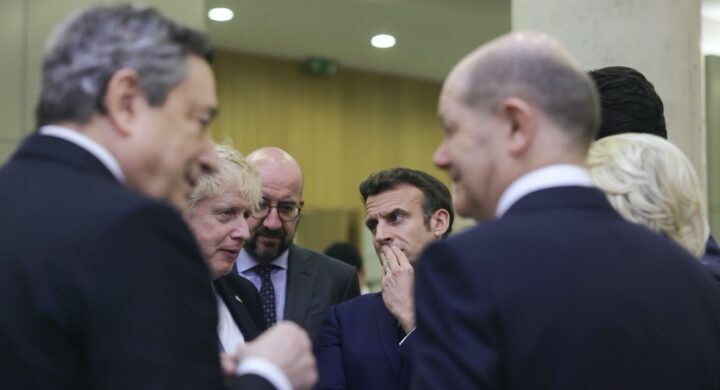
Berlin, Paris and Rome need to send three clear messages to control inflation and domestic social volatility. It could also help Moscow to come to its senses, stop the war and re-stabilize Russia.
The war in Ukraine is hybrid and integrated on many fronts, probably much more than all wars of the past. Therefore, one must look at its various elements to deal with it.
President Vladimir Putin’s Russia wants a clear military victory on the ground, which it still does not have after nearly four months of fighting. A formidable obstacle to this is the supply of Western arms to the Ukrainians, which give Kyiv material means and psychological support.
Cutting off these supplies could give Moscow a major advantage. Of course, it would not be decisive because Ukrainian determination to fight to the end is now clear. But in a clash of attrition, where the Russians no longer take prisoners but raze towns and villages to depopulate them, the lack or abundance of artillery on either side plays a critical role.
The weapons Putin uses against these supplies are the old seeds of discord in the West.
Higher gas and grain prices lead to generalized cost-of-living increases in the West, and represent the reality of inflation, which has otherwise been absent for 40 years. These are not the only elements—there is also the consequence of the mountain of money put into circulation during the Covid crisis—but the gas and grain crises can be incendiary on this kindling.
These phenomena, in turn, are making voters in Western democracies ask, why do you have to pay the bill for a war in Ukraine that we do not care about? The message is passed directly, through agents, provocateurs or people who legitimately think so. But no matter the “how,” what matters is the question, legitimate and accurate: Why should Europe pay a price for helping Ukrainians against the Russians?
Who is winning or losing
The answer in former Soviet Europe, worried about the Russian advance to the west, is obvious: to maintain our freedom. One fights in Kyiv to not fight in Warsaw or Prague. In America, home of the myth of freedom, thousands of miles away from the front lines and without fear of energy or grain shortages, the answer is also easy: You must stop despotism where you can.
Less obvious is the response in Western Europe, accustomed for 30 years to the idea that Moscow is not a danger and that former Soviet satellites can be more troublesome than Russia itself.
Russians in fact see a rosy picture. They say: we already control 25% of the territory of Ukraine, which represents 75% of Ukraine’s GDP. Ukrainians are losing 200-500 troops per day and all viable equipment. The Ukraine army is demoralized and surrenders daily.
Some westerners have a very different opinion. Russians had reportedly over 30,000 dead and thousands more disabled, in less than four months. It is about three times as many official dead as during the Afghan war over nine years. Moreover, the Russian population is about half that of the USSR. The afghani war shattered the Soviet Union. Can Russia now withstand the weight of the fight? Yes, Russia has food and raw materials and could withstand a siege. But can it really? People used to a modicum of welfare resent going back to poverty, more than being always poor. Russians, in the past 30 years, improved their living conditions; are they so willing to go back to starving for the motherland and the conquest of Ukraine?
The Ukrainians are losing more, indeed, but they defend their country; the accounts then are sorted in a different ledger. Afghanistan was destroyed, yet Afghani people didn’t yield; there is no clear sign that Ukrainians are giving up now.
Yes, Russia can portray the war as a fight against corrupt woke western values, as the invasion of Afghanistan in the 1980s was to stop the American capitalist advance in Central Asia, but whipping up an ideology, although helpful, is not enough to win a war.
In fact, despite all recent Russian spins on the war, some political results are crystal clear: NATO is back from the dead and expanding with new Finnish and Swedish membership; the EU is following America and not going against it; Ukraine is enjoying greater international support than ever in its history. These are all things that Moscow wanted to avoid by invading Ukraine in the first place.
Yet at this stage of the war, when prices begin to soar and Moscow may harbor false hopes, a further European response is needed. Otherwise, the economic crisis in Italy or Germany starts, Europe hesitates, military supplies dwindle, and the fortunes in the battle in Ukraine turn. In perhaps a short time, the war extends beyond Ukraine as the EU collapses and goes mad.
Actually, there will not be a political crisis in Europe, caused by the splitting of the anti-Russian front on the old continent. There wasn’t at the beginning of the conflict, and it is much harder for there to be now when so much is at stake. But hesitations, uncertainties, and out-of-tune voices bounce back to Moscow and can create a sense of false confidence that in turn gives support and breathing space to the Russian voices for the continuation of war in Ukraine.
Back to basics
That is why we need perhaps to go back to basics, with cartoonish answers that are useful in framing the picture.
The world produces more grain than it needs. Countries like Argentina, the US, Canada, or Brazil can each alone feed the entire planet. The problem is contingent on the next harvest and planting timing, but there are still supplies at least until the end of the year.
Yes, everyone would be happier if the Ukrainian crop came on the market, but even the threat of blocking it is weak because the Russian fleet is skeletal, and a few missiles could sink it. Of course, the war would escalate at that point, but no one has any interest in making it worse. The world can cope with the situation in the coming months.
Gas is more complex. Again, however, it is not a matter of life and death. There is more gas in the world than mineral water, and in fact the latter costs more. The problem is that there is so much of it that new fields are not explored for fear of lowering prices. It is convenient, though, to use gas from a pipe built decades ago and costs nothing today.
It would take one to two years to replace Russian supplies with gas from elsewhere in the world or even from Italy. And it could take longer if Italy and Europe decide to pursue a strategy of energy autonomy and start building nuclear power plants.
But even here, even in the short term, there are no intractable problems, although they are serious. There are stocks, and governments have alternative supply measures in place.
The discriminator is panic, which could generate, as it already is generating, alarm in the markets.
The real issue here is the duration of the war. A frictional, slow, scorched-earth clash becomes crucial not for the Ukrainian front but the Italian, French, or German front. If the Russian army does not achieve military successes in the field, the echo of cannon fire rings in Western Europe. It may shake the determination to supply Ukraine and helps unravel the knot Moscow has gotten itself into. This solution, however, as we have seen, would sink Europe under Moscow.
It requires three messages that are genuine and true from Rome, Berlin, and Paris:
- The war is ending. It is ending because Russia is short of men. Buriatians, Ossetians, and Chechens but not Russians, are dying. It cannot announce a general mobilization that would admit defeat of the “special operation”; the home front is more split than in the West. The end will come in a day or a year, but Moscow cannot make it. The proof is that Russia still has hopes in the hesitations and crises of the Western front.
- Everyone wants Russia’s stability. A deep crisis in Russia, as there was 30 years ago in the USSR, would be most dangerous. It is in no one’s interest. In this Russian stability, there may or may not be Putin. These are the facts for the Russians, not the French who are rooting for him, or the Americans who may be against him.
- A solution is in sight. In light of points 1 and 2, it is clear that no one has any interest in prolonging a stalemate that consumes everyone, especially the Russians.
These three messages would help calm the gas and grain markets and thus also help push through the price cap on gas, proposed by Prime Minister Mario Draghi, about which some Europeans are still hesitant.
If that happens, on the one hand, the panic would ease. Russian hopes of a turn in the war would fade, and peace would come closer. One might reasonably think of a horizon of a few weeks or months to douse the flames of war.
The ball, however, is perhaps now in old Europe’s course, not Moscow’s.






Ho qualche perplessità sulla solidità della teoria sostenuta dall’articolo. Solo a titolo esemplificativo 2 considerazioni.
La prima. Come mai la guerra è sparita dai titoli della maggior parte dei media americani, e in particolare quelli che sostengono il duo Biden\Democratici? E sono cresciuti gli articoli di riflessione su come far finire la guerra? Io penso che con le elezioni di medio termine il destino dell’Ucraina è segnato.
La seconda. Come mai i media specializzati in economia affermano che le sanzioni stabilite per fermare Mosca stanno ritornando indietro sotto forma di inflazione e recessione per Europa, USA e UK. Chi è quindi destinato a fermarsi non è la Russia. Anche qui, le elezioni di medio termine metteranno fine alla giostra delle sanzioni.
Intanto Cina, Russia, India, Brasile, Sudafrica ringraziano per l’opportunità offerta. In particolare, le materie prime diventeranno la nuova valuta su cui si baserà il futuro equilibrio economico. E chi ha stabilito le sanzioni si troverà a discutere con i sanzionati su come aggirare le sanzioni!!!
E purtroppo non c’è niente da ridere!
Fairy tales are not the solution.
In 2014 US organized the Maidan coup to replace the far from perfect Ukrainian democracy with a truly fake one. That organzation included armed gangs that Ukrainian oligarchs used against each other and armed fascists, among them the Azov batallion. The fascists had slight electoral appeal but were important enough for the new regime to try to eliminate the use of the Russian language, the second largest mother tongue among more than a dozen languages. This let to the loss of Crimea to Russia by democratic means, and with that the protection of the largest Russian naval base in the Black Sea. It also enabled Russia to set up a rebellion in the Donbas, an area of Russian spekers. The rebellion was protected against air attacks by the provision of Russian shoulder launched anti-aircraft missiles.
On July 17 the Ukrainian army shot down MH17 killing 298 people and blaimed the rebels who had a Buk launcher nearby.
Two days later the Netherlands set up a Joint Investigation Team that also included Australia, Belgium and Malaysia and that explicitly excluded Russia and Ukraine because they too had Buk launchers nearby. Another three days later Ukraine was included because according to my Dutch newspaper NRC at the time then it could provide evidence in the Russian and Ukrainian languages without that having to be checked by the original members of JIT. Of course that checking would not have been a problem if Russia or the rebels had shot down the aircraft. Thirteen months later JIT said that the launcher in the hands of the rebels had been unable to launch any missile, something Ukrainian army HQ must have known before the rebels took the launcher from one of its bases.
In 2014 and ’15 the Ukrainian army was unable to defeat the rebels but Kiev and Washington refused to implement the political solution to the problems of the country, Minsk 2, even after it was unanimously endorsed by the UN Security Council. Instead US sponsored the development and equipment of a much larger army which seemed ready to assault the Donbas in early March. Instead Russia started the war on Februari 24 with the purpose to destroy the Ukrainian army, to kill its fascist elements and to prevent Ukraine becoming part of NATO. It had seen NATO defending itself for a dozen years against the people of Afghanistan.
Russia is now destroying the military industries of Ukraine, the available military supplies in the country even as new ones are delivered and destroying the army while not at the same time destroying its civilian infrastructure outside the actual combat areas.
Russia will cut out of Ukraine the Donbas and part or all of the Black Sea coast but will not conquer all of Ukraine. It will leave all the debts incurred with Kiev. Its own income from oil, gas, fertilizer and wheat is now larger than it was expecting even while giving deep discounts to its many friends. On the other hand US and Western Europe has more serious economic problems. See for example: https://asiatimes.com/2022/06/a-dangerous-implosion-of-american-politics/.
Popular support for the Russian government is also much larger than for western governments.